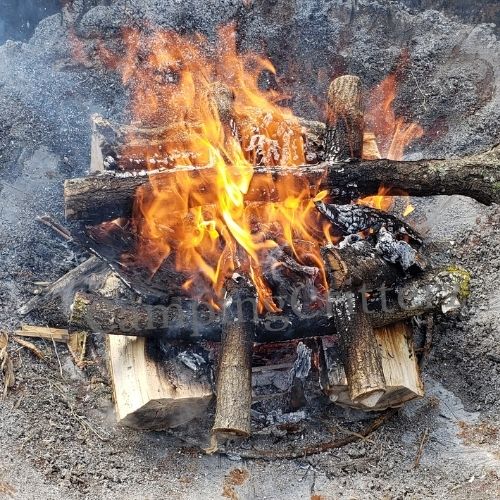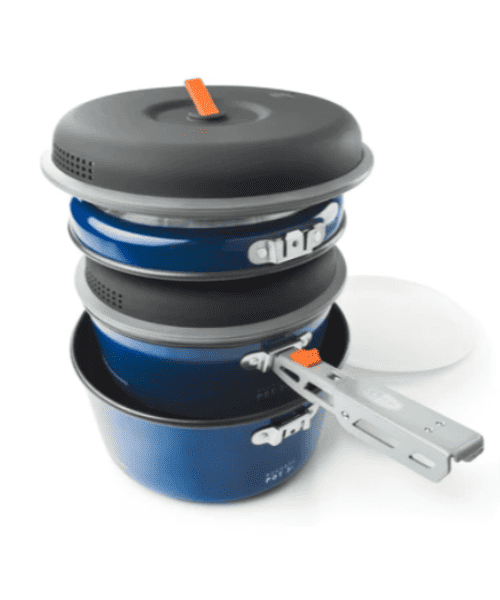How to Properly Dispose of Dirty Dishwater When Camping
Eating great food while camping is always a good time, but then you need to know how to dispose of dishwater when camping.
There’s nothing quite like roasting marshmallows over the fire or cooking up some fireside chili. The problem arises when it’s time to wash dishes in the great outdoors.
We’ll cover some basics, including where to dump water, how to make your dishwashing less harmful, and how to save water on your next camping trip.
How to Dispose of Dishwater When Camping
Dirty dishwater is harmful to the environment. It contains bacteria from food residue and chemicals from cleaners.
Introducing these factors into a natural environment could disrupt the ecosystem, and even hurt the plants and animals.
Let’s talk about how to dispose of dishwater while camping to avoid this issue. Here is what to do with your dishwater after you’re done washing dishes.
Strain Food Particles Out of the Water
One way to limit the amount of pollution you add to a campsite is to not spreading food scraps around. We all know food scraps attract animals and make them dependent on humans and possible sick.
While you’re heating water to wash dishes, scrape all the food scraps from your dirty dishes into the garbage.
After you’re done washing dishes, strain food particles out of the water. You can use an actual strainer or colander.
Pack out for food scraps in a trash bag, don’t scatter them or burn them. If you’re in bear country, it’s best practice to put this with the garbage and food bags in the bear box.
Find an Area 200’ From a Water Source
Sometimes, there’s nowhere to dump dishwater but the ground. I’ve been there. Not all campgrounds have grey water dump sites.
If this is the case, I recommend dumping as far from a natural water source as possible. Walk 200 feet (Using my normal walk, this is 80 steps. Using big steps, it’s 65) away from the water.
Food particles and soap residue can mess up the pH balance of a water source. Small animals may try to eat food residue impacted by soap and get sick.
Broadcast Your Dishwater Over a Large Area
When dumping your dishwater is a necessity, don’t pour it all in one spot. Broadcast (or cascade) your dishwater over a wide area to help lessen the environmental impact.

Broadcast it by holding onto your pot and turning while you dump the water. Imagine you’re trying to get the water to cover the largest area possible.
Find a New Area Next Time
A good rule is to dump in different places every time you wash up. If you’re in one campsite for a few days, don’t always dump the dishwater behind the same tree.
Use different areas in the site so no one area is receiving concentrated water waste.
Put Out the Fire
You can use your cold water to make sure your campfire is out at the end of the night.

Keep a bucket with your rinse water (it will be clean water compared to the wash water) next to the fire pit. Use that water to make sure your fire is completely out before you head to bed.
Check Local Regulations
In our state, an RVs are not allowed to dump grey water on the ground. State campgrounds prohibit dumping of dirty dishwater in the bathrooms, but more are creating a dishwashing station for car camping.

If you’re backpack camping however, you are not expected to pack out your soapy water, so follow the guidelines below.
Where Not to Dump Dishwater
We’ve talked a lot about where and how to dump water. Now, let’s touch on where not to dump.
There are some places in nature where you should never dump dish water.
Natural Bodies of Water
I touched on this above, but you never want to dump anything in a natural body of water. I know, it’s also water, but it’s contaminated with food and soap.

Keep your dishwater away from rivers, lakes, ponds, and even the ocean if you can help it.
This also means no washing dishes in the lake.
In the Same Spot More Than Once
If you have a pup at home, you’re probably aware of the dead grassy spots in your yard. This happens when your dog uses the same spot to do their business over and over again.
The same is true for dishwater. It might not be as acidic as pet urine, but soap is a natural plant killer.
The more you pour dishwater on a tree trunk, shrub, or even the grass, the faster it dies.
Campground Bathroom Sink
It seems intuitive to dump dishwater down the sink when you’re done washing dishes. The dirty water goes down the kitchen sink at home, right?

At home our kitchen sinks are outfitted with drain traps, garbage disposals, and other tools to keep large pieces of debris from clogging the drain. Campgrounds don’t have those tools in place.
If you feel the need to dump dishwater in the bathroom to avoid dumping it into nature, opt for the toilet.
Toilet plumbing is set up to manage food waste (in another way). As long as you don’t dump any leftovers or large chunks of food, it should be fine.
(Note: Only flush dishwater down a toilet if it’s a fully functional flushable toilet. Don’t dump it down a portapotty, outhouse, latrine, or composting toilet).
Right Next to Your Tent
You never want to dump anything with food particles in it near your tent. Leaving food anywhere is a good way to attract insects, and in some cases, animals.
Dispose of dishwater properly by cascading it in an area that’s well away from your tent to ensure you don’t attract any unwanted visitors at night.
Making Dishwater Less Harmful
In the end, dishwater has to go somewhere. Why not make it eco-friendly?
I felt so guilty teaching our son to respect nature and then dumping soapy water on the ground.
Here are a few ways we minimize the damage of dumping our dishwater when camping.
Use Biodegradable Soap
Being an avid camper, I use more biodegradable products now than I ever used to. One product we don’t mind investing in is biodegradable dish soap.
This is great to use at home too. Biodegradable soap breaks down through UV rays and other biological action.
You should still never use biodegradable soap in natural water sources like rivers or lakes.
Some options for more environmentally friendly soap include Sea to Summit Wilderness Wash and Camp Suds.
Wait Until Water Cools
Dumping hot water is more damaging to the landscape and plants around your campsite. Wait for the dirty water to cool to room temperature, or slightly warm, before dumping it.
Think about the way water arrives naturally outside. Rainwater isn’t hot when it hits the ground.
Use Less Water to Wash Dishes
The less water you use while washing up, the less grey water you need to dump. Conserving water isn’t only better for your campsite, it’s better for the environment at large.

This is a great way to minimize your footprint on the planet.
Use Less Soap to Wash Dishes
While you’re reducing water, you might as well reduce soap. Just a few drops of dish soap goes a long way.
Only use soap when you have to, and try to minimize the amount that goes into the wash basin. A few drops of soap in the basin is enough to create a tub full of sudsy bubbles.
Reducing Water Usage
Using less water and soap is helpful, but there may be times you don’t need to use water at all. Wiping out crumbs from a plate you ate a sandwich off of, for example, saves the full dishwashing experience.
Anything you can clean by wiping with a damp rag is helpful in preserving your camp environment. Biodegradable baby wipes are useful in this way.
Use Fewer Dishes
When possible, use fewer dishes to save on washing up. Some ways to reduce dish use include:
- Sharing plates or bowls
- Using a single utensil (spork) instead of multiples
- Eat out of the package when possible
- Use compostable paper plates
Using fewer dishes means less work for you, and less to carry if you’re hiking into your site. Only pack what you need so you’re not tempted to use more dishes instead of reusing or cleaning the ones you have.
Use a Small Squeeze Bottle
Manage your water output by using a small squeeze bottle full of water. Rinse soap and residue from the dishes with the squeeze bottle. It’s better than soaking dishes or pouring water over them in a wash basin.
You’ll use less soap this way because you’re focused on what’s coming out of the bottle. Make it a challenge and see how long you can go before refilling the bottle.
Take turns with your friends or family when it’s time to wash up and see who can use less.
Dishwater Dumping FAQs

I’m Molly Foss, aka Momma Critter. I’ve been camping since I was 9 years old and I always wanted to be Robin Hood and live in the forest when I grew up. I’m excited to share my love of camping with my son as he grows up. My favorite thing to do while camping is roast marshmallows over the fire.









